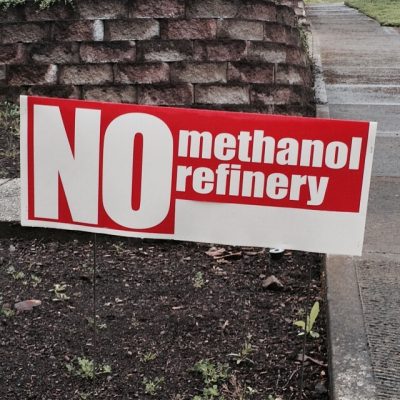Sixteen Environmental, Public-health Organizations Oppose Greenwashing of Fracked Gas-to-methanol Refinery

Environmental and public-health organizations sent a clear message of opposition to the proposed Kalama methanol refinery today with comments submitted on a draft climate report for the project.
The organizations, including Sierra Club, Washington Physicians for Social Responsibility, the Center for Biological Diversity and Columbia Riverkeeper, disputed claims made by the refinery’s backers about the climate benefits of building the world’s largest fracked gas-to-methanol refinery. More than 25,000 comments from the public were submitted in opposition to the methanol refinery.
“Governor Inslee and the Washington Department of Ecology need to be climate champions and deny this project,” said Jasmine Zimmer-Stucky, senior organizer for Columbia Riverkeeper. “We’re calling on Governor Inslee and Ecology to scrutinize the corporation’s misleading and incomplete evaluation of building the world’s largest fracked gas-to-methanol refinery and see the project for what it is: a mega climate polluter.”
“It’s appalling that we’re even still considering this disaster of a project,” said Jared Margolis, a senior attorney at the Center for Biological Diversity. “This dirty refinery would harm communities and wildlife along the Columbia River and fuel the climate catastrophe Washington is supposed to help curb, not escalate. Governor Inslee shouldn’t let corporate profits come before our neighbors’ health.”
Highlights from the “draft supplemental environmental impact statement” comments include:
- The draft study relies on an implausible methane leakage rate of 0.32 percent to evaluate the amount of greenhouse gases that will be emitted by upstream activity, including producing, processing and transporting gas to the Kalama refinery.
- The draft relies on discredited and outdated “bottom-up” methane leakage evaluation metrics that underestimate the climate-disrupting impact of methane rather than a more recent top-down approach. Bottom-up studies use an estimate of the average emissions from an individual piece of equipment or an individual event.
- The draft uses unsupported claims that the gas received at the Kalama facility would be from Canada, “primarily from the Montney formation in British Columbia.” A similar environmental review for the proposed Tacoma LNG facility made the same questionable claim and was met with skepticism from the Washington attorney general. Both reviews were conducted by the same environmental consulting firm.
- The draft fails to use the proper 20-year global warming potential of methane gas — the primary ingredient in natural gas — and instead relies on the long-term 100-year impact. Twenty years is a far more relevant time scale for discussing climate impacts due to methane pollution than 100 years. Using the 20-year GWP of methane significantly increases the life cycle of greenhouse gas emissions attributable to the Kalama methanol refinery.
- The draft relies on highly speculative assumptions about global methanol markets and China’s use of coal-based methanol production. The report relies on a series of questionable assumptions about global methanol markets, energy commodity prices, Chinese government policy and U.S.-China trade relations to conclude the project results in a net climate benefit.
- The study fails to properly account for the greenhouse gas impacts of methanol as a fuel source, a probable use of the methanol produced in Kalama. An April 2017 China Daily article quotes We Lebin, the chairman of the Kalama project’s parent company, saying that the plant’s output could “replace diesel, coal and gas with methanol to power vehicles.” Lebin doubled down on the claims in a December 2017 Reuters article, saying that, “[the company] also wants to drive use of methanol as a transportation fuel for cars and ships.” Yet the report does not analyze the greenhouse gas impacts of using the facility’s methanol as fuel in comparison to non-fossil alternatives such as electric vehicles.
The following organizations submitted the comments: Columbia Riverkeeper, Sierra Club, the Center for Biological Diversity, Stand.earth, Oregon Physicians for Social Responsibility, Food and Water Watch, Washington Physicians for Social Responsibility, 350 PDX, Rogue Climate, 350 Seattle, 350 Tacoma, 350 Eastside, Bark, Green Energy Institute, Center for Sustainable Economy and Cascadia Wildlands.
The comment period on the draft study closes today at 5 p.m. Lifecycle Associates, the environmental contractor hired by Northwest Innovation Works to complete the report for the Port of Kalama and Cowlitz County, will produce a final study, called a “final supplemental environmental impact statement.” Cowlitz County and the Washington Department of Ecology will review it. Commenters are calling on the county and ecology department to deny the Shoreline Conditional Use permit requested by Northwest Innovation Works.
*
Note to readers: please click the share buttons above. Forward this article to your email lists. Crosspost on your blog site, internet forums. etc.
Sources
- DSEIS Comments submitted December 27, 2018
- Kalama Methanol Hearing Draws Strong Opposition to Fracked Gas, December 2018
- Methanol Company Downplays Climate Impact of Refinery, November 2018
- FOIA Lawsuit: U.S. Dept. of Energy Withholding Info about Financial Aid for Proposed Petrochemical Plant, August 2018
- Port Broke Law By Ignoring Greenhouse Gas Pollution, April 2018
- State Board Rules that Port Of Kalama Violated Washington Law by Failing to Evaluate Greenhouse Gas Impacts, September 2017
Featured image is from Clean Air Kalama

